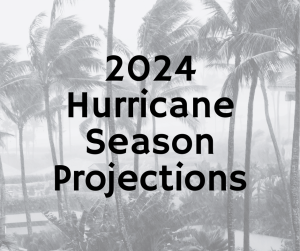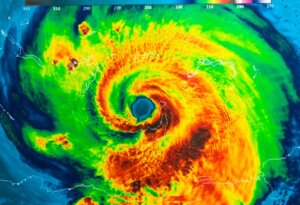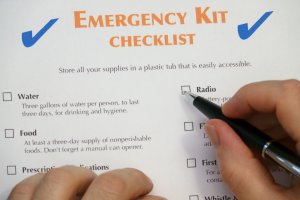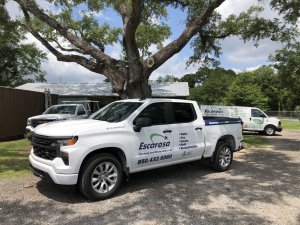2024 Hurricane Season Projections: The Florida Panhandle Faces Heightened Activity - Escarosa

The 2024 hurricane season is set to bring significant challenges to the Florida Panhandle, with early projections indicating an uptick in storm activity.
Hurricane season runs from June 1st to November 30th. During this period, residents and businesses in the area must brace for the possibility of severe storms and damage.
Understanding the potential impact of these storms is crucial for mitigating damage and ensuring safety.
Amidst this season’s forecasts, the importance of hurricane preparedness cannot be overstated.
If your home is damaged by a storm, Escarosa Cleaning and Restoration provides expert post-hurricane restoration services.
2024 Hurricane Season Predictions
The predictions for the 2024 hurricane season suggest it will be more active than average due to warmer ocean temperatures and atmospheric conditions.
Experts from the National Hurricane Center anticipate:
-
An increase in the number of named storms, with projections indicating between 14 and 20 named storms.
-
Out of these, 6 to 10 could strengthen into hurricanes, with 3 to 5 potentially reaching major hurricane status (Category 3 or above on the Saffir-Simpson scale).
-
The Gulf of Mexico, including the Florida Panhandle, is expected to experience a higher probability of hurricane landfalls due to the predicted weather patterns.
-
The Florida Panhandle’s unique geographical position, stretching out into the Gulf of Mexico, coupled with prevailing weather patterns, makes it particularly vulnerable to hurricanes. This area often finds itself directly in the path of storms moving northward from the Gulf or eastward from the Eastern Seaboard, leading to an increased risk of hurricane impact during the season.
-
El Niño or La Niña events could further influence the season’s intensity and storm tracks. Current models hint at a potential La Niña phase, which usually increases hurricane activity in the Atlantic Basin.
Residents in vulnerable areas must closely monitor upcoming forecasts and prepare early for the hurricane season.
Despite the inherent uncertainty in storm paths and intensities, we can’t overstate the importance of early hurricane preparation cannot be overstated.
Early preparation allows residents to secure their homes, arrange necessary evacuations, and gather essential supplies, significantly reducing the potential for property damage and personal risk.
What Makes Hurricanes so Dangerous?

Hurricanes also bring heavy rains, causing severe flooding and landslides that significantly damage infrastructure and endanger human lives.
The storm’s winds generate a storm surge, an abnormal rise in water that devastates coastal areas with catastrophic flooding.
The combination of high winds, heavy rainfall, storm surge, and resultant flooding makes hurricanes some of the most formidable natural disasters.
How to Prepare for Hurricane Season: 8 Tips
-
Develop a Hurricane Plan
Develop a detailed plan outlining the steps your family will take if a hurricane is imminent. This plan should include how you will stay informed through emergency alerts and outline actions to ensure everyone’s safety.
-
Assemble a Hurricane Preparedness Kit
Ensure you have sufficient supplies to prepare for emergencies.
This includes the following:
-
Water
-
A variety of non-perishable food items
-
Medications you or your family members may require
-
Flashlights and batteries
-
First aid items to address minor injuries or health issues that may arise.
-
Prepare Your Home
To protect your home during severe weather conditions, it’s crucial to reinforce windows and doors to prevent them from breaking.
Additionally, trim any trees close to your house that could potentially fall on it during a storm, reducing the risk of damage.
Also, secure outdoor items such as patio furniture, grills, and garden decorations that could become projectiles in strong winds.
-
Review Insurance Policies
It’s crucial to regularly review your insurance policies to ensure that your coverage is current.
It should also be comprehensive enough to include protection against hurricane-related damage, which should specifically cover flooding.
This precautionary measure is essential to safeguard your property and finances from the potentially devastating impact of hurricanes.
-
Know Your Evacuation Zone
It’s essential to familiarize yourself with local evacuation routes ahead of time.
Take the time to review maps and understand the various paths you could take in an emergency.
Additionally, plan and decide on a safe destination where you would go if you were required to evacuate your home. This preparation can significantly reduce stress and confusion in the event of an actual evacuation.
-
Secure Important Documents
Ensure the safety of critical documents by storing them in waterproof containers or converting them to digital formats.
This includes personal identification, insurance policies, and medical records, which are essential in emergencies and for future reference.
-
Plan for Pets
Ensure the safety of your pets during emergencies by preparing a pet emergency kit that includes food, water, medications, and essential documents.
Additionally, research and know the locations of pet-friendly evacuation shelters or accommodations.
-
Stay Informed
Monitoring local news outlets and weather reports regularly is crucial to ensuring your safety and preparedness during hurricane season.
Staying informed about the latest hurricane developments and following official advisories can help you make timely decisions to protect yourself and your loved ones.
Actions to Take During a Hurricane
Follow these tips to keep yourself safe during the storm:
-
Stay Updated on Weather Reports: Monitor local news and weather channels for updates and advisories. Utilize a battery-operated or hand-crank radio in case of power outages.
-
Evacuate if Advised: Follow evacuation orders from local authorities immediately. Use pre-planned evacuation routes and head to a predetermined safe location.
-
Secure Your Home: Board up windows and doors with plywood or use storm shutters to protect against flying debris. Move outdoor furniture inside to prevent it from becoming airborne.
-
Use Sand Bags: To mitigate flooding, place sandbags around your home, especially near doors and low-lying areas.
-
Turn Off Utilities: Turn off main switches for gas, water, and electricity to prevent damage and reduce the risk of fire or explosion.
-
Stay Indoors and In a Safe Room: Choose a small, windowless interior room above the line of the flood waters.
-
Conserve Mobile Phone Battery: To conserve battery life, use mobile phones only for emergencies. Keep portable chargers fully charged and ready.
-
Stay Away From Windows and Glass Doors: Even if they are covered, keep a safe distance from windows, glass doors, and other potential flying debris areas.
-
Prepare an Emergency Supply Kit: Ensure your emergency supply kit is stocked with essential items, including water, non-perishable foods, medications, and first aid supplies.
-
Listen for Emergency Information and Alerts: Pay attention to emergency alerts and information from local officials, which can provide specific safety advice and instructions.
-
Do Not Attempt to Traverse Flooded Areas: Stay away from flooded areas, including roads and bridges. Just a few inches of moving water can sweep vehicles away.
-
Check on Neighbors: If safe, check on neighbors, especially older people and those who may require additional assistance.
Picking up the Pieces After a Storm: Escarosa Cleaning & Restoration is Here to Help
Hurricane recovery and restoration pose a multi-faceted challenge beyond the initial impact.
The emotional impact of seeing one’s home and belongings damaged can overwhelm anyone.
Without prompt and effective action, water damage can undermine a home’s structural integrity and cause long-term problems like mold, which carries serious health risks.
Fortunately, Escarosa Cleaning & Restoration is here to help.
Our services address the most urgent post-hurricane needs, including water damage repair, mold remediation, and content cleaning.
Ready to learn more? Contact us today.














